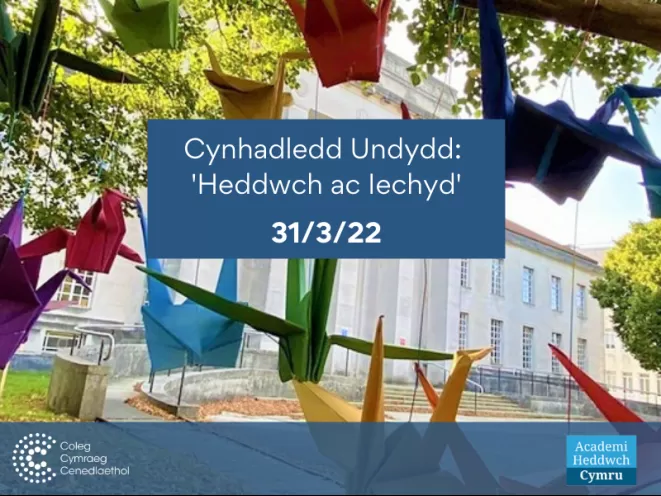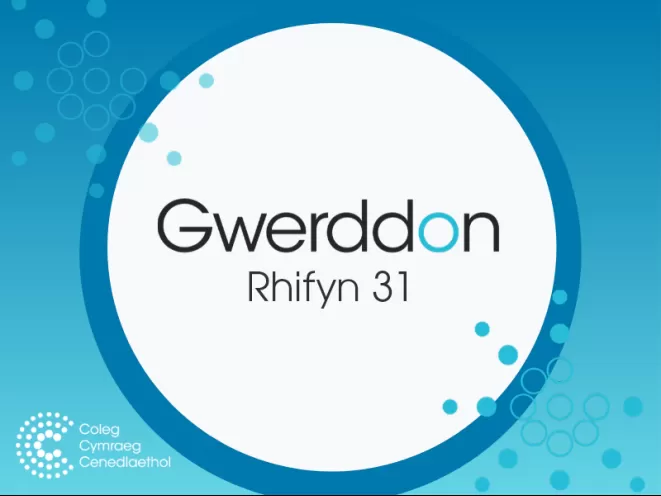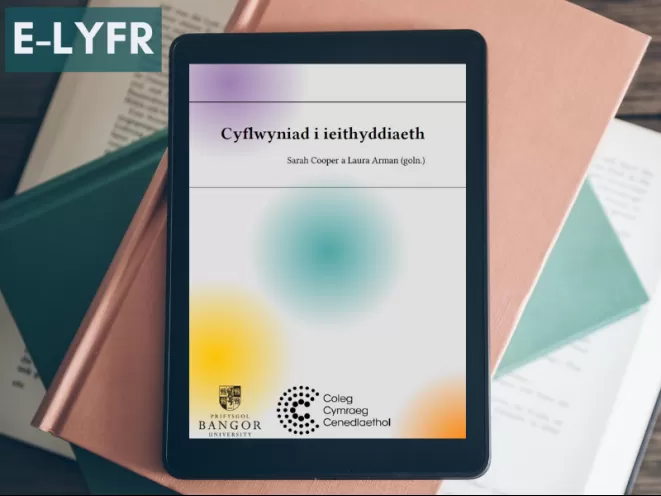On March 31st, 2022, Academi Heddwch will be hosting a one-day (on-line) conference on the theme of Peace and Health. In partnership with the Coleg Cymraeg Cenedlaethol and Aberystwyth University, the call for papers for this event has attracted contributions that explore peace and health through a variety of lenses. Throughout the day, panels will be discussing peace and health in the context of e.g.: urban planning language planning engineering water well-being marginalised groups creativity Keynote speakers: Professor Rowan Williams, Chair of Academi Heddwch Professor Colin McInnes, Aberystwyth University
One day conference: 'Peace and Health'
Ar-lên 2021-22: Revision Webinars for AS/A Level Welsh students (December 2021 - March 2022)
These live revision webinars are organized by the Coleg Cymraeg Cenedlaethol for year 12 and 13 students studying AS / A Level Welsh (First Language). The sessions will be hosted by lecturers from the Welsh departments of Bangor, Aberystwyth, Swansea and Cardiff universities, with the aim of enhancing your understanding of some of the literature topics you are studying in class. The sessions will be held in Welsh through Zoom between 4.30-5.15pm on Wednesday afternoons, with the first session on Wednesday 1 December 2021. 2021 1 December 2021: Dafydd ap Gwilym, Dr Dylan Foster Evans, Prifysgol Caerdydd (Bl.13) 8 December 2021: Gwerthfawrogi Rhyddiaith, Yr Athro Angharad Price, Prifysgol Bangor (Bl.13 + Bl.12) 2022 2 February 2022: Ymarfer Papur Gramadeg, Dr Alex Lovell, Prifysgol Abertawe (Bl.12) 9 February 2022: Hedd Wyn (Ffilm), Yr Athro Tudur Hallam, Prifysgol Abertawe (Bl.12) 16 February 2022: Branwen, Dr Aled Llion Jones, Prifysgol Bangor (Bl.13) 2 March 2022: Martha, Jac a Sianco (Caryl Lewis), Dr Bleddyn Owen Huws, Prifysgol Aberystwyth (Bl.13) 9 March 2022: Sul y Mamau yn Greenham (Menna Elfyn), Dr Rhiannon Marks, Prifysgol Caerdydd (Bl.12) 16 March 2022: Y Genhedlaeth Goll (Alan Llwyd), Yr Athro Mererid Hopwood, Prifysgol Aberystwyth The link for the event will be emailed to you on the day or the day before. Pupils, students, teachers and student teachers welcome. You'll be able to contribute or ask questions using the chat. Remember to follow the @CymraegCCC Twitter account and Instagram @instagymraeg account for more information and news about Welsh as a Subject. To register, click on the registration form link below:
Studying Welsh at university (Webinar)
Webinar: Studying Welsh at university In year 12 or 13? Want to know more about studying Welsh as a subject at university? Find out more about what's on offer, and hear the opinions of our ambassadors studying the subject about their courses and their life as students of Welsh. Presentation recorded in November 2021. Includes: General information about studying Welsh at university, e.g. Where can you study Welsh? What can you study in terms of courses and modules? What financial help is available? (up to 19 minutes) Conversation between our ambassadors and current students about studying Welsh at university (19 minutes onwards) Welsh medium presentation.
Jerry Hunter, 'Perthnasedd Poen ac Undonedd: Kate Roberts a Ffuglen y 1930au' (2021)
This article considers the development of Welsh fiction in the 1930s by examining various ideas concerning the nature of realism. Reading the correspondence between Saunders Lewis and Kate Roberts is a means of analysing the ways in which the two authors perceived the essentials of a realist aesthetics. Saunders Lewis’s reaction to the first draft of the novel Traed mewn Cyffion (‘Feet in Chains’) is discussed along with Kate Roberts’s suggestion made while defending the work that ‘pain and monotony’ are relevant in the 1930s and valid literary themes. It is suggested that Kate’s appeal to the work of the Irish novelist Peadar O’Donnell is important in order to understand her aesthetics. The relationship between Traed mewn Cyffion and one of O’Donnell’s novels, Islanders, is then examined.
Ar-lên Recordings (Revision Webinars for AS/A Level Welsh students) March - May 2021
Revision webinars organized by the Coleg Cymraeg Cenedlaethol for year 12 and 13 students studying AS / A level Welsh. The sessions are hosted by lecturers from the Welsh departments of Bangor, Aberystwyth, Swansea and Cardiff universities, with the aim of enhancing your understanding of some of the literature topics you are studying in class. Recordings through the medium of Welsh. Remember to follow the @CymraegCCC Twitter account and Instagram @instagymraeg account for more information and news about Welsh as a Subject. New Ar-lên session for 2021-22 are taking place between 1 December 2021 and 16 March 2022. Click here to view the schedule and to register.
Operation Rescue by Rufus Mufasa
Poet and performer Rufus Mufasa reads one of her Welsh language poems, 'Operation Rescue' to celebrate International Mother Language Day 2021. Includes a video of the reading, a PDF copy of the words for study material and another short video where Rufus talks about her relationship with the Welsh language. © Rufus Mufasa 2021
“Can I just call you Clio? Like the Renault?” A poem by Llio Elain Maddocks
Poet Llio Elain Maddocks reads a poem from her work - "Can I just call you Clio? Like the Renault?” Stwff ma hogia 'di ddeud wrtha fi, vol.8 - to celebrate International Mother Language Day 2021. © Llio Elain Maddocks 2021
Mamiaith by Rhys Iorwerth
A new poem 'Mamiaith' by poet Rhys Iorwerth, commissioned for International Mother Language Day 2021. © Rhys Iorwerth 2021
Turning the Tide in Thirty Years - the importance of Welsh in modern Wales
Turning the Tide in Thirty Years - the importance of Welsh in modern Wales
This online module looks at the importance of good Welsh language skills on entering the world of work. It specifically considers the advantages of continuing to study Welsh after GCSE. The module is mainly aimed at pupils and students in schools, further education colleges and universities. It can also be of use to anyone who wishes to learn about the Welsh language's place and status in contemporary Wales and how we can all make a contribution to the Welsh Government's aim of reaching a million Welsh speakers by 2050. Winner of the Welsh-medium resource award in the Coleg Cymraeg's annual Associate Lecturers Awards.
Cyflogadwyedd, cyfrifoldeb,cael digon o’r Gymraeg? Dewisiadau ieithyddol dysgwyr Addysg Bellach (Employability...
This article explores the reasons for the low number of learners studying through the medium of Welsh and bilingually in the Further Education sector, focusing on vocational learners. It suggests recommendations to improve the situation in the context of the Welsh Government’s target of a million Welsh speakers by 2050. The research is based on semi- structured interviews with staff in schools and Further Education colleges, and on focus groups with Year 11 pupils, in four areas across Wales. The study found that economic, cultural and educational factors influence learners’ choices. The article proposes a language awareness programme as a means of expanding the discourse of Welsh as an instrument of employability and the discourse of the advantages of bilingualism to encompass social advantages.
Introduction to Linguistics
"Cyflwyniad i Ieithyddiaeth" is an introduction to the essentials of Linguistics for students who have no background, or not a great deal of background in studying language and the subjects of Linguistics (e.e. the sounds of languages, morphology and syntax, meaning, multilingualism and sociolinguistics).
Studying A Level Welsh First Language
This is a collection of resources for AS and A level Welsh First Language pupils and teachers. The resources are elevant to the specification, and offer support and encouragement as we adapt to a new way of learning and teaching at an unprecedented period in Welsh education. The collection contains various material such as video clips, promotional materials and links to external websites.












